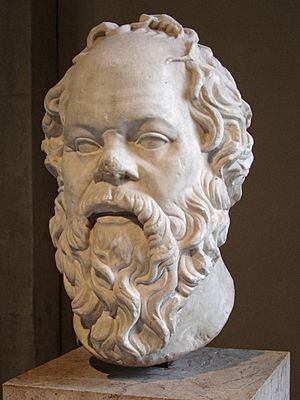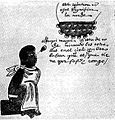Philosophy facts for kids
Philosophy is a way of thinking deeply about the world, the universe, and even society. It involves asking very basic questions about how we think, what the universe is like, and how everything connects. Philosophical ideas can be big and abstract, but they are still about real life. For example, Ethics asks how we can be good in our daily lives. Metaphysics explores how the world works and what it's made of.
Sometimes people say they have a ‘personal philosophy’. This means their own way of looking at the world. This article is not about those personal ideas. Instead, it's about the big ideas that philosophers (people who think and write about these deep questions) have discussed for a very long time.
One big philosophical question is: "Is there anything we know for sure that no one could ever doubt?" Other questions philosophers ask include:
- What is good?
- What is beauty?
- Do we have free will (the ability to choose)?
- Does God exist?
- Does the world around us truly exist?
- What is a person?
- What is truth?
- What is evil?
- How are our mind and body connected?
- What is science?
- What is philosophy itself?
- What is love?
Contents
What is Philosophy?
The word "philosophy" comes from two Greek words. They mean "love of wisdom." The word philos means "beloved," and sophia means "wisdom."
There are many different types of philosophy from different times and places. Some famous philosophers came from Ancient Greece, like Plato and Aristotle. Others came from Asia, such as Confucius or Buddha. Some lived in Europe during the Middle Ages, like William of Ockham or Saint Thomas Aquinas.
Later philosophers from the 1600s, 1700s, and 1800s include Thomas Hobbes, René Descartes, John Locke, David Hume, and Immanuel Kant. In the 1900s, important philosophers were Ludwig Wittgenstein and Jean-Paul Sartre.
Main Areas of Philosophy
Philosophy is the study of humans and the world by thinking deeply and asking questions. It's like both a science and an art. Philosophy tries to answer big questions by exploring real things and always asking "why?"
Sometimes, philosophy asks the same questions as religion and science. However, philosophers don't all agree on the answers. Many types of philosophy even question or challenge the beliefs of science and religion.
The famous philosopher Immanuel Kant asked these important questions:
- What can I know?
- What should I do?
- What can I hope for?
- What is a human being?
The answers to these questions help us divide philosophy into different areas.
Different Branches of Philosophy
Philosophy can be split into different groups based on the kinds of questions it asks. A set of answers to these questions can be called a 'philosophy'. There are many different 'philosophies' because people have many different answers. Not all philosophies ask the same questions. Here are some questions often asked by philosophers from the Western world:
Metaphysics Metaphysics explores the basic nature of reality. It asks about what is real. This area sometimes includes ontology (the study of being), the philosophy of mind, and the philosophy of religion. These areas are very closely linked.
Ontology: What is Real?
- What is the world we see around us? (What is reality?)
- Is there more to the world than what we can see or hear?
- If no one sees something happen, does that mean it didn't happen?
- What does it mean for something to be possible? Do other worlds exist?
- Is there anything special about being a human being or being alive?
- If not, why do some people think there is?
- What is space? What is time?
Philosophy of Mind: How Do We Think?
- What is a mind?
- What is a body?
- What is consciousness (being aware)?
- Do people truly make choices, or can they only choose one thing? (Do people have free will?)
- What makes words or ideas meaningful? (How do words connect to what they mean?)
Philosophy of Religion: Beliefs and Existence
In epistemology Epistemology is the study of knowledge.
In ethics Ethics is about right and wrong actions.
- What is right and wrong, good and bad?
- Should people do some things and not others?
- What is justice?
In aesthetics Aesthetics explores beauty and art.
- What is beauty? If one person thinks a painting is beautiful, but another thinks it's ugly, can it be both?
- Are true things beautiful?
- Are good things beautiful?
- What is art? We usually think a sculpture in a museum is art. If a sculptor makes a clay rock and puts it in a museum, many call it art. But if someone picks up a rock from the ground, is that rock art?
In logic Logic is about correct reasoning.
- What do the words we use really mean?
- How can we express ideas clearly, so they only have one meaning?
- Can all ideas be put into language?
- How does the truth of an argument's starting points (premise) affect the truth of its final statement?
- How can we reason correctly?
In axiology Axiology is the study of value.
- What has value?
- Is time truly money, or have we made it so?
- Do love, beauty, or justice hold any value?
Other areas include eschatology (study of final events), teleology (study of purpose), and theology (study of religious belief). In the past, natural science was part of philosophy, called "natural philosophy."
Is Philosophy Helpful?
Does philosophy do any good? Most people would agree it does. It's easy to say philosophy is good because it helps people think more clearly. It helps us understand the world and how people act and think. Philosophers believe that asking philosophical questions is useful. It brings wisdom and helps us learn about the world and each other. Some philosophers might even say that asking "Is philosophy good or bad?" is a philosophical question itself!
However, some people think philosophy can be harmful. This is because it encourages free-thinking and often questions beliefs that others hold strongly. For example, some existentialist ideas suggest there is no meaning to life except what we create ourselves. People from some religions might disagree with these ideas.
It's important to know that every major science, like physics, biology, and chemistry, started as part of philosophy. As people thought more deeply and analyzed nature, these subjects became separate fields. This process continues today; psychology only became a separate science in the last century. Even now, subjects like consciousness studies and applied ethics are becoming more independent from philosophy. This shows that philosophy is useful because it helps create new kinds of science.
What Philosophers Do
Philosophers ask questions about ideas (concepts). They try to find answers to these questions. Sometimes, thinkers find it hard to find the right words to describe their ideas. When they find answers, philosophers often face the same problem: how to best share their answers with others. The meaning of their answers can change depending on the words they use.
Some philosophers are full-time thinkers called academics. They work for universities or colleges. These philosophers write books and articles about philosophy. They also teach philosophy classes to students.
Other philosophers are "hobby" thinkers. They think about philosophy in their free time. A few hobby thinkers have thought so much about philosophy that they write articles for philosophy magazines. Other people approach philosophy through their main jobs. For example, monks, artists, and scientists might think about philosophical ideas and questions.
Most philosophers work by asking questions and looking for good definitions (meanings) of words. This helps them understand what a question truly means.
Some philosophers believe that the only thing needed to answer a question is to figure out what it means. They think that philosophical questions are difficult only because people don't really know what they mean. Ludwig Wittgenstein believed this.
Philosophers often use real and imaginary examples to make a point. For instance, they might write about a real or made-up person. This helps them show what they think a good or bad person is like.
Some philosophers look for the simplest way to answer a question. They often believe this is probably the right answer. This idea is called Occam's razor. Others think that complicated answers can also be correct. For an example of a philosophical problem, you can look up the God paradox.
Philosophers use logic to solve problems and answer questions. Being logically consistent is key for any good theory. Philosophers who disagree with a theory often try to find a logical contradiction in it. If they find one, they have a reason to reject that theory. If they don't find a contradiction, a philosopher might show that the theory leads to a conclusion that is unacceptable or silly. This second method is called reductio ad absurdum.
Some Famous Philosophers
Here are some well-known philosophers.
Ancient Greek Philosophers
Later European and Western Philosophers
- Saint Augustine
- Saint Thomas Aquinas
- Duns Scotus
- Bonaventure
- William of Ockham
- George Berkeley
- Auguste Comte
- René Descartes
- Ralph Waldo Emerson
- Friedrich Engels
- Georg Wilhelm Frederich Hegel
- Thomas Hobbes
- David Hume
- Immanuel Kant
- Søren Kierkegaard
- Gottfried Wilhelm Leibniz
- John Locke
- Niccolò Machiavelli
- John Stuart Mill
- Jean-Jacques Rousseau
- Arthur Schopenhauer
- Baruch Spinoza
- William Whewell
- Karl Marx
- Friedrich Nietzsche
Modern European and American Philosophers
- Louis Althusser
- G. E. M. Anscombe
- Simone de Beauvoir
- David Chalmers
- Christian DeQuincey
- Michel Foucault
- Martin Heidegger
- Karl Popper
- John Rawls
- Bertrand Russell
- Jean-Paul Sartre
- Ludwig Wittgenstein
- Albert Camus
Asian and Eastern Philosophers
- Avicenna
- Osho
- Confucius
- Siddhārta Gautama (the Gautama Buddha)
- Omar Khayyám
- Nanak
- Chuang Tzu
- Lao Tzu
- Sohrevardi
- Allama Iqbal
Images for kids
-
The School of Athens (1509–1511) by Raphael, showing famous classical Greek philosophers in an ideal setting inspired by ancient Greek architecture.
-
The Vinegar Tasters (Japan, Edo period, 1802-1816) by Kanō Isen'in. It shows the three main philosophical figures in East Asian thought: Buddha, Confucius and Laozi.
-
Statue of Aristotle (384–322 BCE), a major figure of ancient Greek philosophy, in Aristotle's Park, Stagira.
-
A painting of the influential modern philosopher Immanuel Kant (in the blue coat) with his friends. Other figures include Christian Jakob Kraus, Johann Georg Hamann, Theodor Gottlieb von Hippel and Karl Gottfried Hagen.
-
Adi Shankara is one of the most studied Hindu philosophers.
-
Statue of the Neo-Confucian scholar Zhu Xi at the White Deer Grotto Academy in Lushan Mountain.
-
Kitaro Nishida, seen as the founder of the Kyoto School of philosophical thought, around 1943.
-
A picture of Pachacuti worshipping Inti (the sun god) at Coricancha, in the 17th century chronicles by Martín de Murúa. Pachacuti was a major Incan ruler, writer, and poet.
-
Mary Wollstonecraft (1759–1797) was an English writer and philosopher.
-
Dignaga started a school of Buddhist epistemology and logic.
See also
 In Spanish: Filosofía para niños
In Spanish: Filosofía para niños
 | Georgia Louise Harris Brown |
 | Julian Abele |
 | Norma Merrick Sklarek |
 | William Sidney Pittman |



















